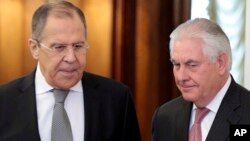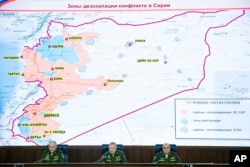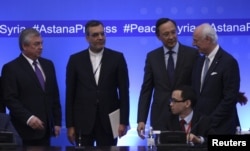U.S. Secretary of State Rex Tillerson is due to meet with Russian Foreign Minister Sergei Lavrov Wednesday in Washington to discuss Syria, Ukraine and other issues.
"On Syria, the secretary intends to discuss efforts to de-escalate violence, provide humanitarian assistance to the Syrian people, and set the stage for a political settlement of the conflict," the State Department said in a statement Monday.
The announcement comes as U.S. Defense Secretary Jim Mattis says the U.S. will closely examine Russia's plan to establish "de-escalation" zones in Syria.
"The devil is always in the details," Mattis said Monday when asked about the initiative. "We will look at the proposal, see if it can work."
Syria de-escalation zones
Russia, Turkey and Iran agreed to a Moscow-proposed deal last week to establish the so-called “de-escalation” zones in Syria in an effort to end the six-year conflict.
The proposal calls for taking measures to reduce fighting in four designated areas of Syria where rebels not associated with Islamic State militants control significant territory.
The plan emerged from the latest round of peace talks that Russia, Iran and Turkey held in Astana, Kazakhstan. The U.S. had a senior official at the meeting, but is not a signatory to the agreement.
The initiative went into effect at midnight Friday. Russia said the zones are closed to aircraft from the U.S.-led coalition.
Peace talks
The Astana peace talks are separate from a United Nations effort to bring Syria's warring sides together for negotiations aimed at stopping the fighting and launching a political transition with a new constitution and elections.
U.N. envoy for Syria Staffan de Mistura said Monday he hopes the Astana de-escalation plan will be fully implemented and help set a good tone for the next round of U.N.-led talks between the Syrian government and rebels due to begin May 16 in Geneva.







